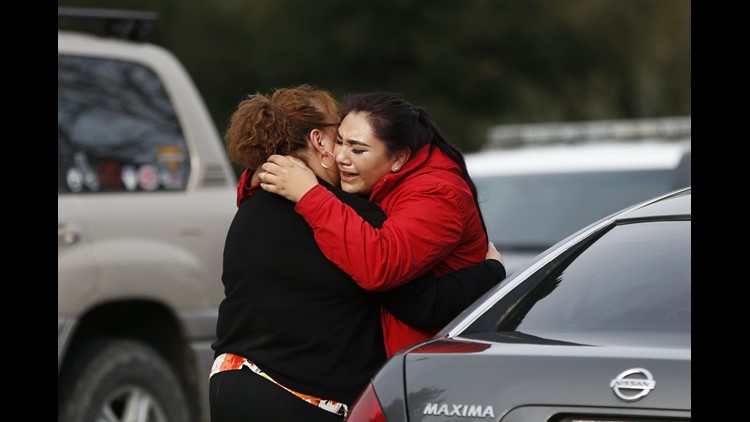YOUNTVILLE, Calif. — The man who killed three hostages at a Northern California veterans’ home suffered from bipolar disorder, various physical ailments and anger issues, sources said.
Authorities said that Albert Wong, a 36-year-old Army veteran, used to be a resident of the Pathway Home, the Yountville facility where he engaged police in a standoff Friday. The Pathway Home, which operates out of the Veterans Home of California, is a nonprofit that helps post-9/11 military veterans reintegrate into civilian life, including by counseling clients with post-traumatic stress disorder.
The ordeal ended when police stormed the building and found Wong and three of the facility’s employees — Jennifer Golick, 42, Christine Loeber, 48, and Jennifer Gonzales, 32 — dead.
Wong had been kicked out of the program after he threatened one of the women, a law enforcement source told CNN.
“Whatever happened out there, he didn’t say he was going to shoot anybody,” Wong’s brother, Tyrone Lampkin, told the Santa Rosa Press Democrat. “He said he wanted to get back at them, talk to them, yell at them, not to kill them. He didn’t mention that.”
“Seemed happy”
Lampkin, who told CNN Wong was his adoptive brother, said they hadn’t seen each other since 2010 but communicated via text.
Records show Wong was in the Army reserves from October 1998 until December 2002 and served in active duty from May 2010 to August 2013. He was deployed to Afghanistan from April 2011 to March 2012, the records show.
Lampkin told CNN Wong seemed OK after his stint in the military.
“He talked to us about it, showed us pictures on Facebook, seemed happy, like nothing was wrong,” said Lampkin, who lives in Minneapolis.
But Wong was dogged by leg and back injuries and struggled with bipolar disorder, Lampkin said. He needed medication for his condition, Lampkin said, but complained that it was ineffective and would go off the drugs because he didn’t think they were helping.
But Cissy Sherr, who had been Wong’s guardian for four years, expressed doubt over whether he had the condition. “I don’t think he had bipolar disorder or manic depression,” she told CNN.
Pathway spokesman Larry Kamer couldn’t confirm whether Wong was in fact bipolar and had been taking his drugs at the time.
“I don’t know and I imagine that no one can speak on his treatment,” Kamer said. “We still have some confidentiality rules.”
Kicked out of Pathway
Lampkin said another brother of theirs told him that Wong had been kicked out of Pathway for having knives, making threats and “not getting along with people.”
Wong then got an apartment with the third brother’s help, Lampkin said. That brother declined to be interviewed.
Kamer said that caregivers had been working with Wong to provide transitional treatment after he left Pathway Home.
“The goal is never to leave somebody outside of the safety net,” he said.
Lampkin said his last text with Wong was three days before the shooting. Lampkin said Wong told him he had gotten a new gun, and said he was “fine.”
Wong was armed Friday with at least a rifle and a shotgun, one of the sources said. He had at least seven firearms registered in his name, two law enforcement sources told CNN.
Sherr, who first met Wong when he was 6 years old, said she was in shock and grieving over the shooting.
She and her husband were legal guardians for Wong for four years after his father died, when Wong was around 8 years old. Wong’s mother had health issues and didn’t play an active part in raising him, Sherr said.
“To my knowledge he was never in trouble in school. He was always a great kid,” she said.
She described him as “very quiet, reserved,” and said that he wanted to serve in the Army just as his father had.
After Afghanistan, Wong stayed with Sherr for a month or two.
“When he came back from Afghanistan, he told me a lot about what he saw and what he had to do over there,” she said. “I think that would change anybody.”
“I didn’t know him in any way to be a spiteful or vengeful kid,” Sherr said. “He didn’t do drugs or drink. I don’t recall mood swings or anything like that.”
‘They were having cake’
The chaos started when the gunman barged into a going-away party for some departing Pathway employees Friday morning, according to Kamer, who said his wife, Devereaux Smith, works there.
“They were having cake and toasting. Apparently he just walked in with this rifle,” Kamer said. He said his wife and other employees managed to escape, though he didn’t say how.
Reports of “shots fired” came in Friday morning. Dozens of law enforcement officers responded about 10:20 a.m. local time, Napa County Sheriff John Robertson said.
As the gunman held the hostages in a room inside the building, authorities tried to make contact and at some point exchanged gunfire with him.
Important part of Napa Valley
The Veterans Home of California and all its programs, including the Pathway Home, are an important part of the Napa Valley community, with a 1,200-seat theater, a golf course and a large library, the California Department of Veterans Affairs said. Residents were temporarily evacuated from the veterans home in October when fires raged through Napa County.
Its staff of 18 people has treated more than 400 veterans since 2008. Male veterans enrolled in the live-in program are mostly soldiers returning from the Iraq and Afghanistan wars who have difficulty transitioning into civilian life.
Dozens of returning veterans have graduated from the program, including Adam Schumann, the subject of the book and Hollywood film “Thank You For Your Service” starring actor Miles Teller.



